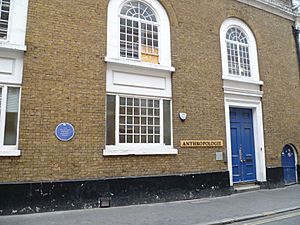West Street Chapel facts for kids
Quick facts for kids West Street Chapel |
|
|---|---|
 |
|
| Location | 26 West Street, London WC2 |
| Country | England |
| Denomination | Anglican |
| Previous denomination | Methodist |
| History | |
| Status | closed |
| Architecture | |
| Years built | 1700 |
The West Street Chapel is an old building in London, located on West Street. It used to be a special church called a chapel. This chapel was very important because it was the first place in London's West End where John Wesley, a famous religious leader, started his Methodist church services.
Contents
The Chapel's Early Days
The West Street Chapel was built in the year 1700. It was first used by a group of people called Huguenots. Huguenots were French Protestants who had to leave France because of their religion. They had worshipped in a different place before moving to this chapel.
John Wesley's Connection
In 1743, John Wesley took over the chapel. He was a very important figure in the Methodist movement. Wesley wrote in his Journal about how he started leading services there. He mentioned that the services could last for five hours! He also gave communion to many people.
Famous Preachers
John Wesley often had help at the chapel from another well-known preacher, George Whitfield. Another important person, John William Fletcher, gave his very first sermon there in 1751. This shows how significant the chapel was for early Methodism.
Later Years and Legacy
After the early 1800s, the chapel began to be used for Anglican worship. The Anglican Church is the main Christian church in England. Today, the building is no longer used as a church.
Remembering John Wesley
Even though it's not a church anymore, the building still reminds people of John Wesley. There is a special plaque on the building that honors his connection to it. A very important piece of history from the chapel, the pulpit, is now in a nearby church called St Giles in the Fields. Both John and Charles Wesley used this pulpit for their sermons between 1741 and 1793.
A Protected Building
The former West Street Chapel is considered a historic building. It has been listed as a Grade II building on the National Heritage List for England since 1951. This means it is protected because of its special history and architecture.
External Links
 | Percy Lavon Julian |
 | Katherine Johnson |
 | George Washington Carver |
 | Annie Easley |

